PSY 305 Cognition Exam II
1/88
There's no tags or description
Looks like no tags are added yet.
Name | Mastery | Learn | Test | Matching | Spaced | Call with Kai |
|---|
No analytics yet
Send a link to your students to track their progress
89 Terms
modal model
we know everything we do because we have a memory system, which is then broken down into representation, processing, and a storehouse of what has been learned.
what makes up a memory
visual, tactile, auditory, olfactory, semantic, temporal attributes
memory as representation
individual distinct multidimensional representations of what has been learned
memory as process

acquisition/learning/encoding of information, leading to storage and maintenance of information, then retrieval
memory as storehouse
we look for specific memories as representations stored in our brain as concepts within the hippocampus and temporal lobe
memory stores
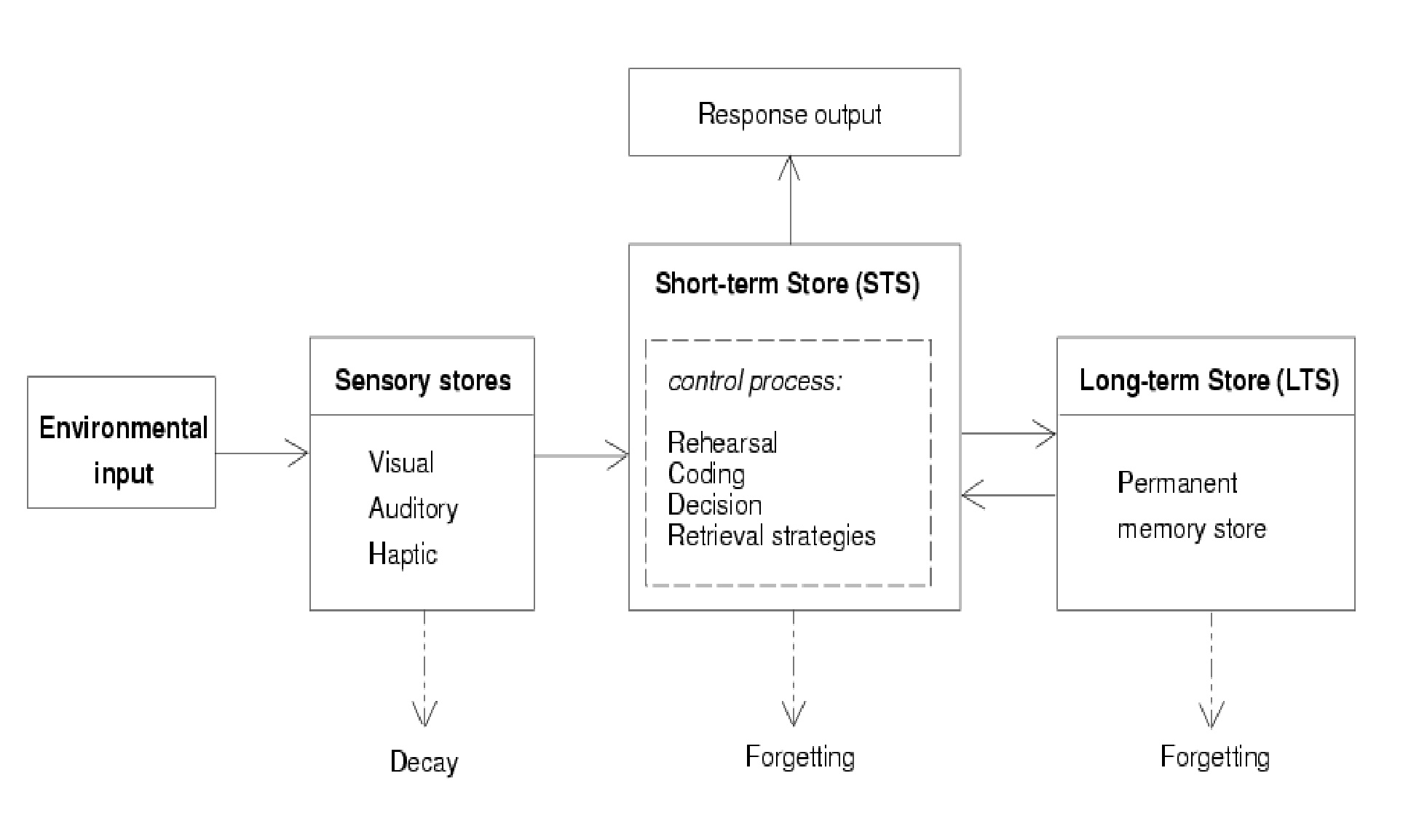
broadbent’s model
three main structures:
s-system: sensory information
p-system: consciousness and limited capacity
secondary memory: everything else
two components of memory. short term memory has a limited capacity where information is rapidly lost from and we must maintain it via rehearsal, whilst long term memory has an unlimited capacity.
memory capacity limit
number of items we can recite back without errors 50% of the time. 7 ± 2 items, or 4 ± 1. we start chunking letters into words and words into sentences
rate of information loss
after a delay, we become inaccurate on recalling particular information from short term memory because old information is constantly being replaced with new information without rehearsal
modal model
makes a number of specific predictions about storage and retrieval relying on free recall
free recall
a series of stimuli scored as correct if a correct item is recalled regardless of its position in a sequence
serial recall
a series of stimuli scored as correct if a correct item is recalled in the correct sequence
serial position curve
recalling items first from short-term memory then long term memory results in both a primacy and recency effect
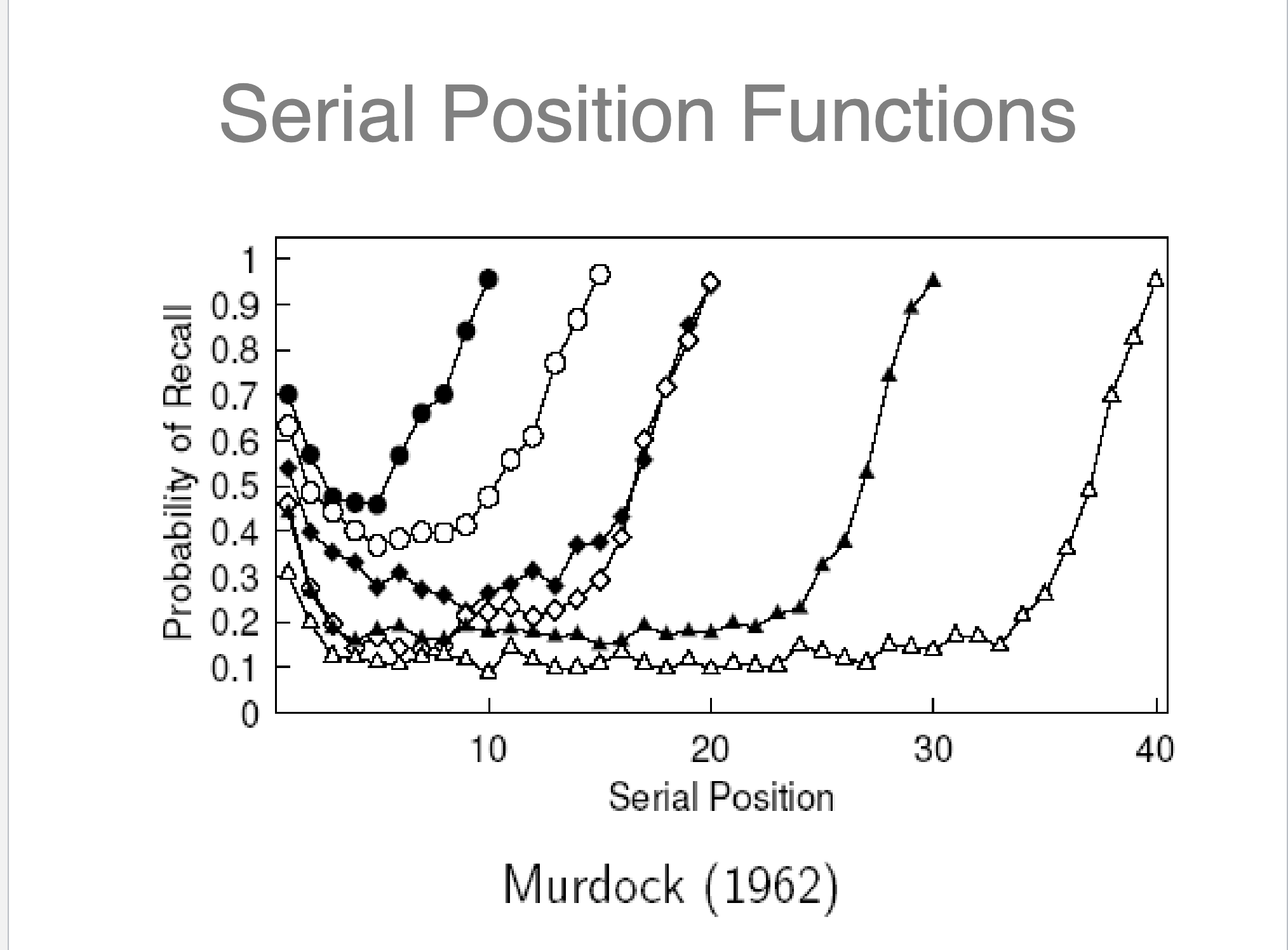
modal model account of primacy
the first few items of a sequence receive more rehearsal than the others and are more thoroughly transferred to LTM
modal model account of recency
the last items shown in a sequence should be the first to be recalled because they are more present in the STM
final free recall
immediate free recall followed by an unrelated activity and then recalling all the stimuli again. proves recency effect is due to the STM because STM stimuli cannot be rehearsed resulting in negative recency
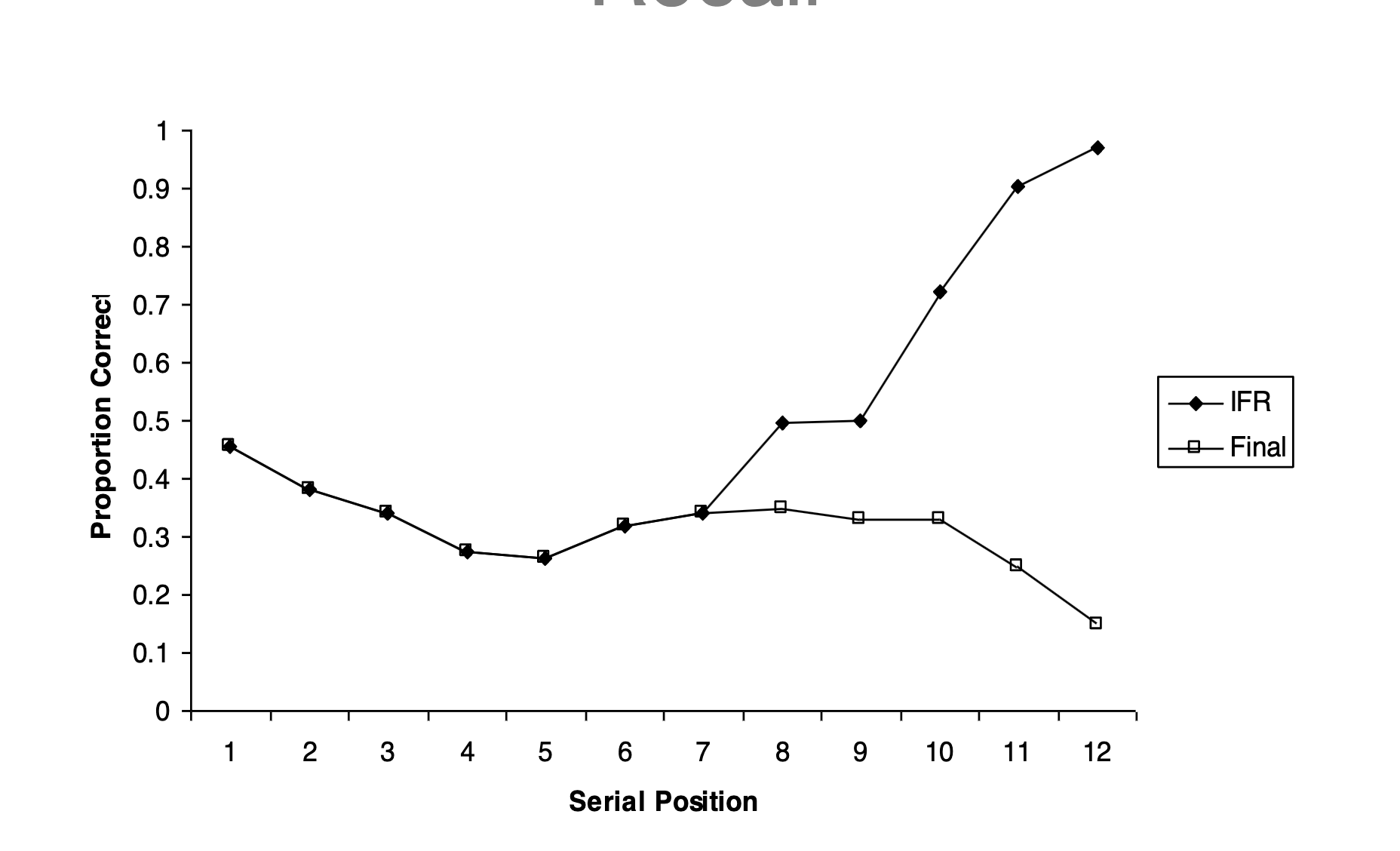
problems with modal model account
is the recency effect actually due to unloading items from the short-term memory?
bjork & whitten methods
free recall where participants perform a secondary task (math equations) before and after each word
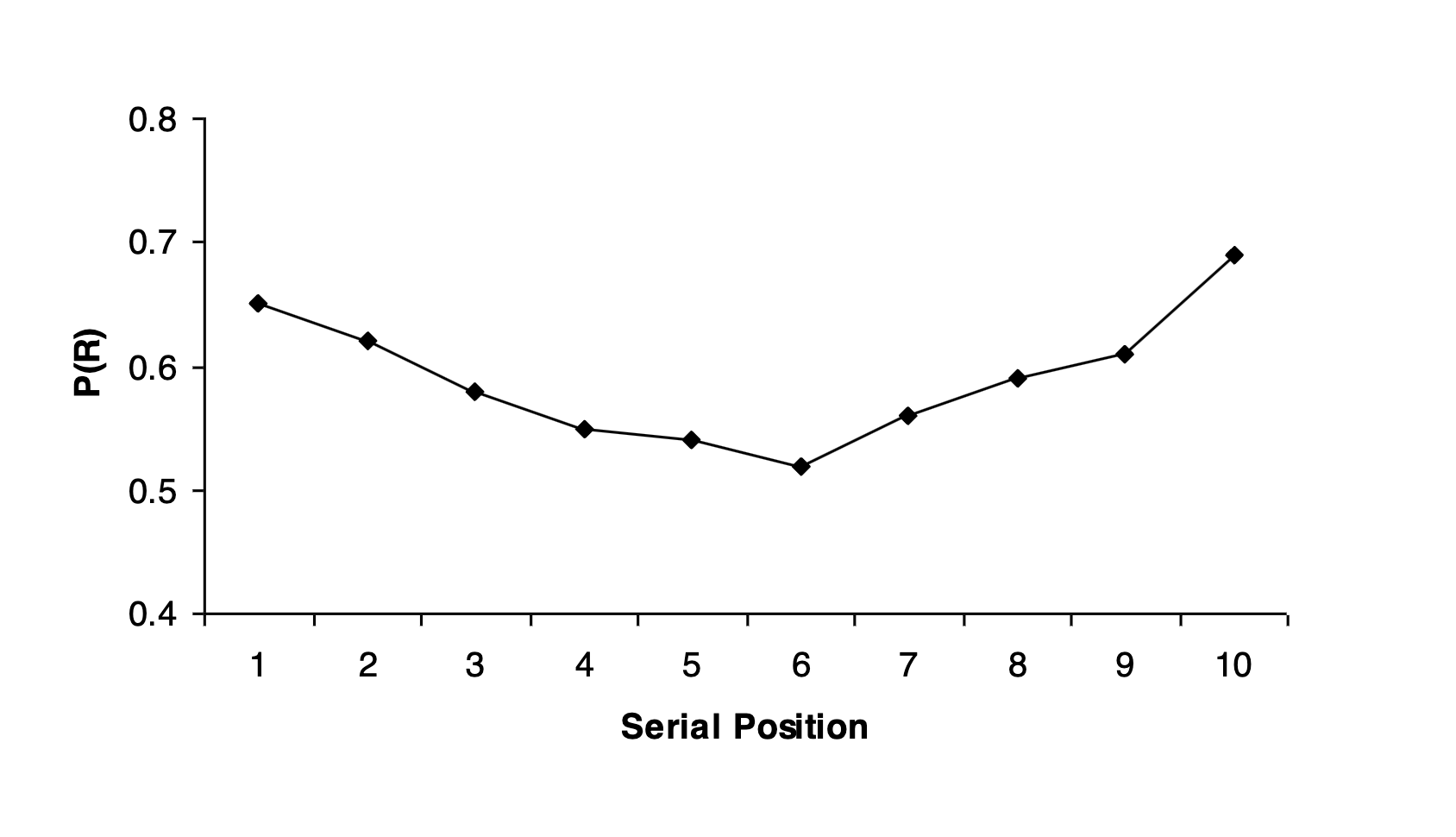
neuropsychological evidence for modal model
HM case study where individual was missing hippocampus and amygdala with retrograde amnesia could have normal perception, speech, above average intelligence, and immediate memory
amnesia
impairments are multimodal, immediate memory is intact, impairment happens despite intact perception and intellect
anterograde amnesia
cannot learn new information
retrograde amnesia
cannot remember old information
working memory
the system for the temporary maintenance and manipulation which is necessary for complex cognitive processes such as learning, reasoning, and comprehension
baddeley and hitch
storage systems are for holding information. one is phonological and one is spatial where a central executive determines what information goes where, the phonological loop receives the most attention
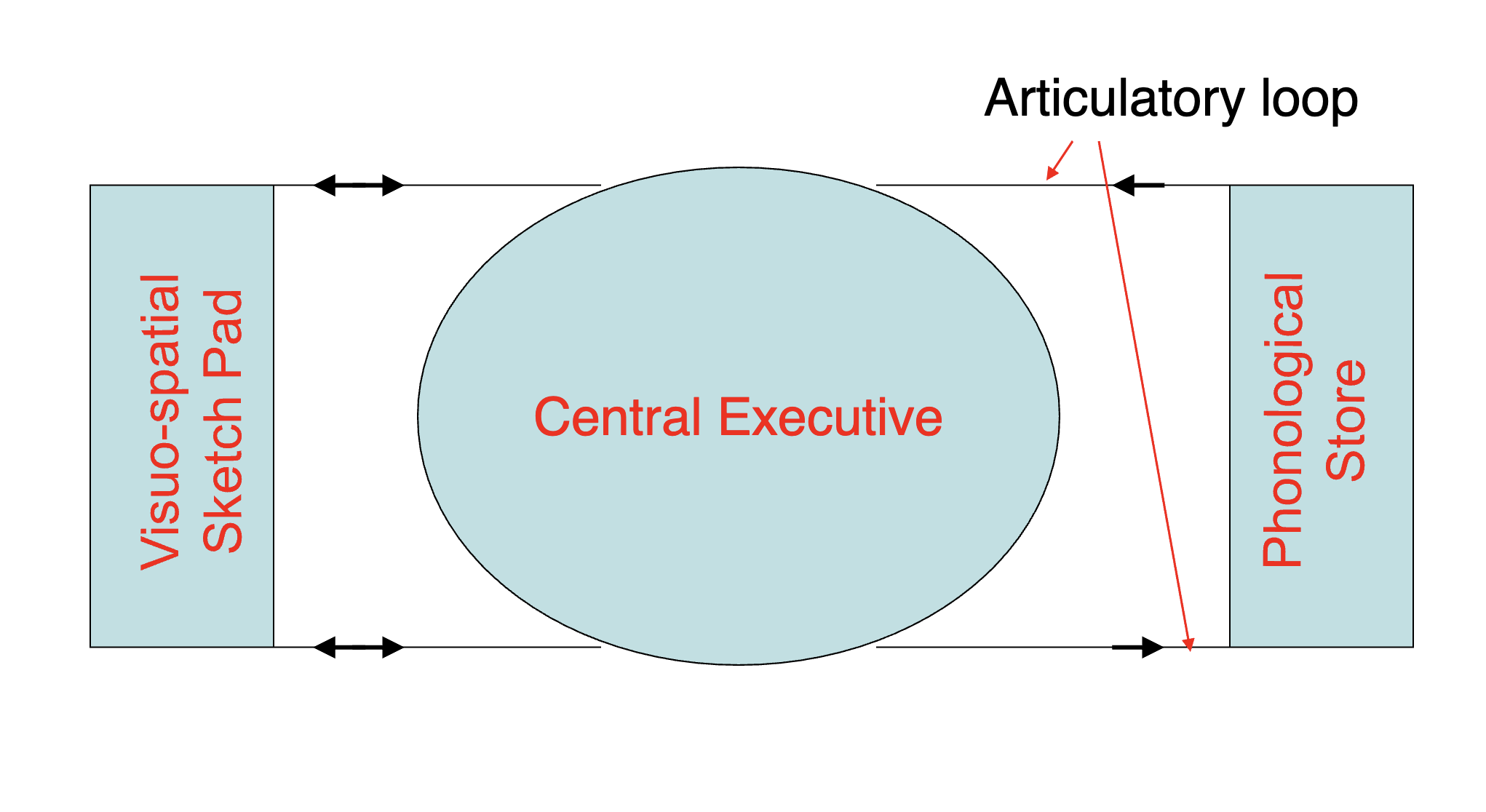
dual task studies
perform a primary task whilst simultaneously performing a secondary task intended to take up the short term memory, resulting in an overt rehearsal of the secondary task. the system responsible for rehearsal and the system responsible for learning are not the same thing
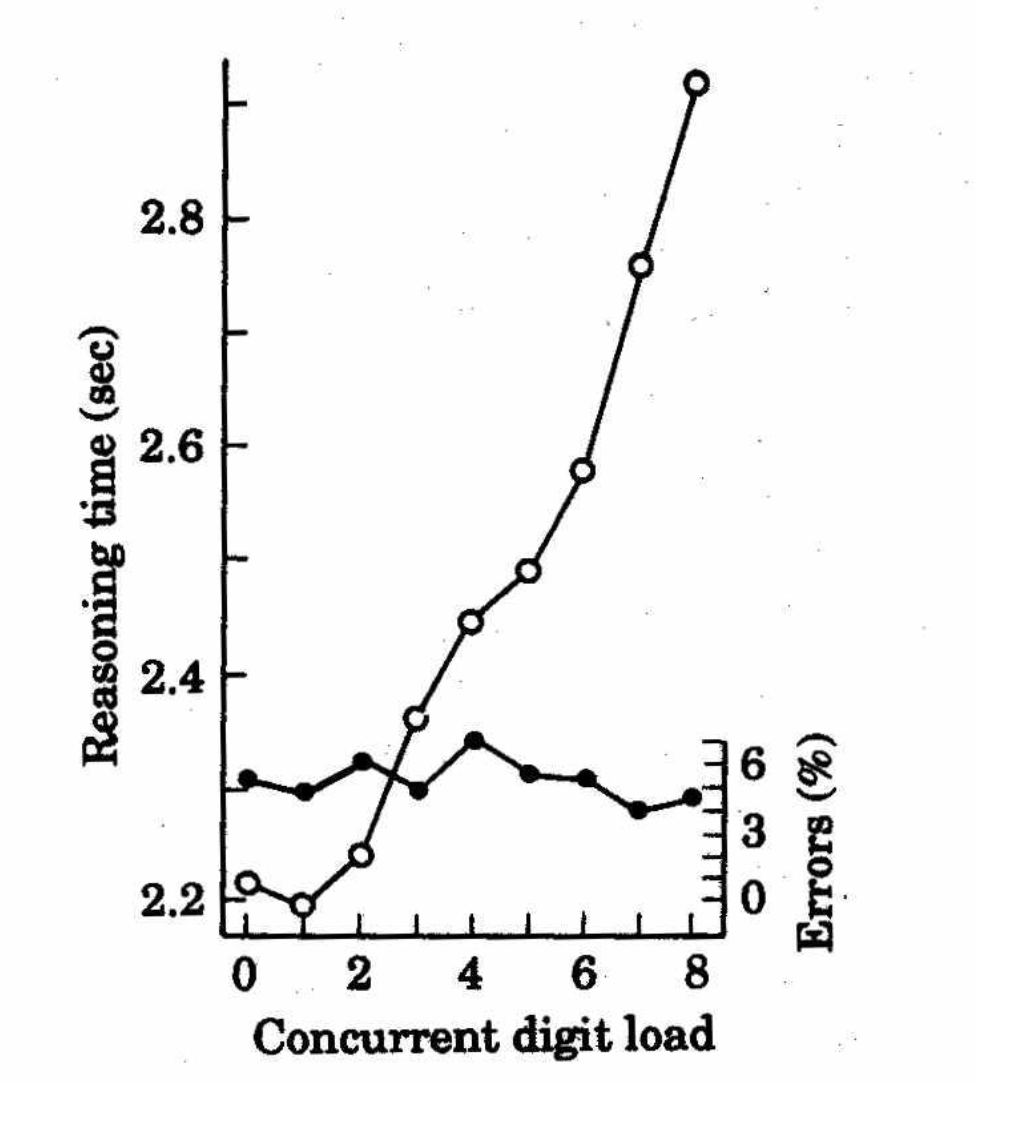
phonological loop
two main components, phonological store and articulatory control processes.
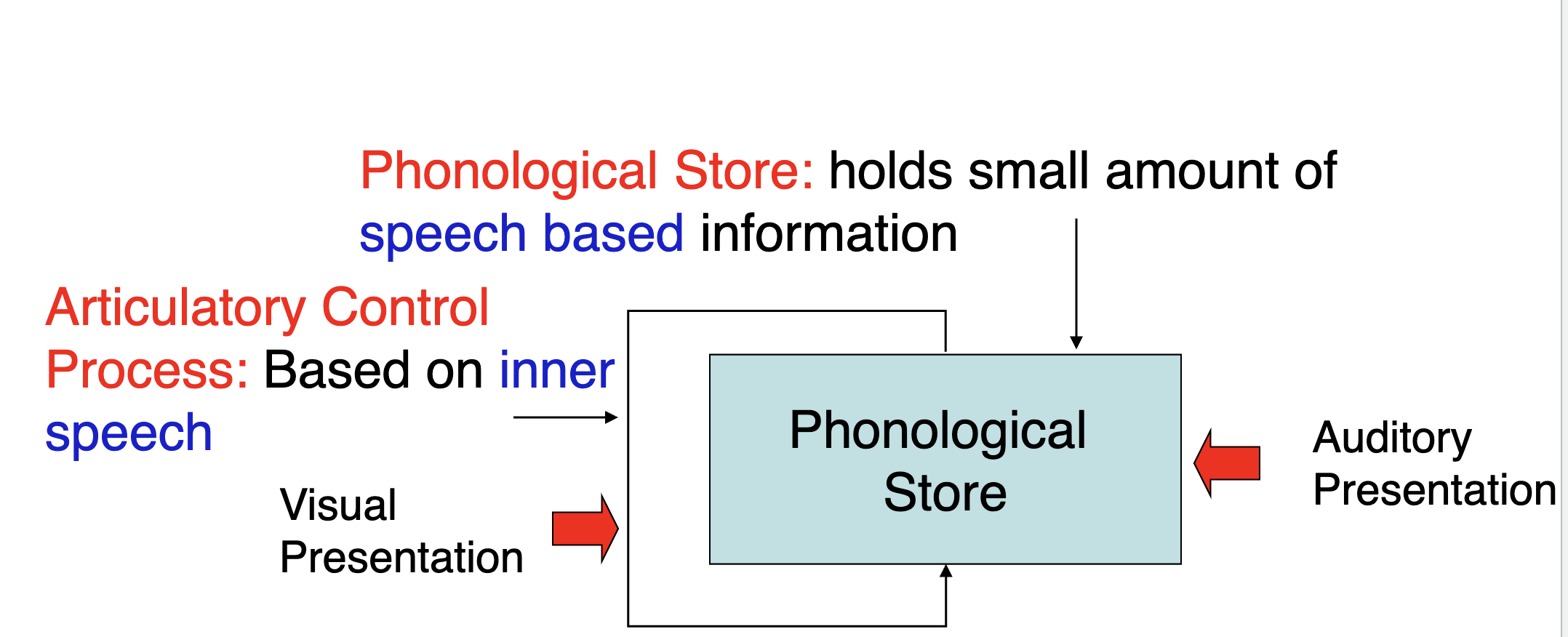
phonological similarity effect
difficult to rehearse words that are phonologically similar (<20% accuracy rate) because items in phonological stores are based on phonemes and similar phonemes interfere
irrelevant speech effect
performance on memory task is impaired if items are accompanied by other verbal material (even if written). this coding in the loop is phonemic, not semantic
word length effect
the phonological loop is finite so longer words take up more space and it is easier to rehearse shorter words
articulatory suppression
subject gets a tongue depressor and repeats words to prevent rehearsal because ear and mouth have privileged access to the phonological loop, results in abolishment of the word length effect and specifies the loop is best for reading and comprehension
visuo-spatial sketchpad
stores and manipulates visuo-spatial information needed when information cannot be put into phonological representation therefore verbal information does not interfere with this
central executive
coordinates system, retrieval, selective attention. related to frontal lobes. least studied but most important portion
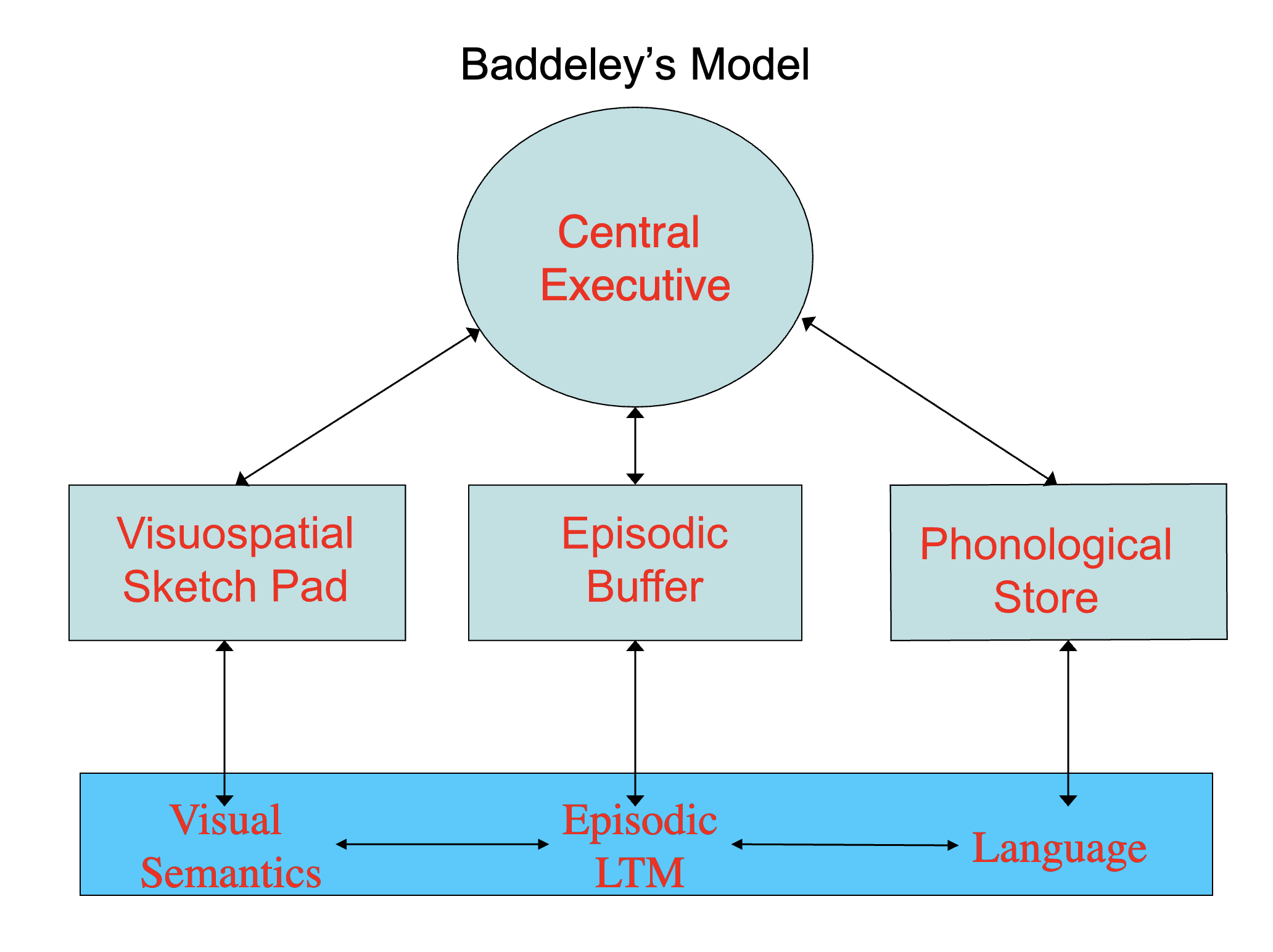
episodic buffer
limited capacity temporary storage system controlled by CE that works with LTS
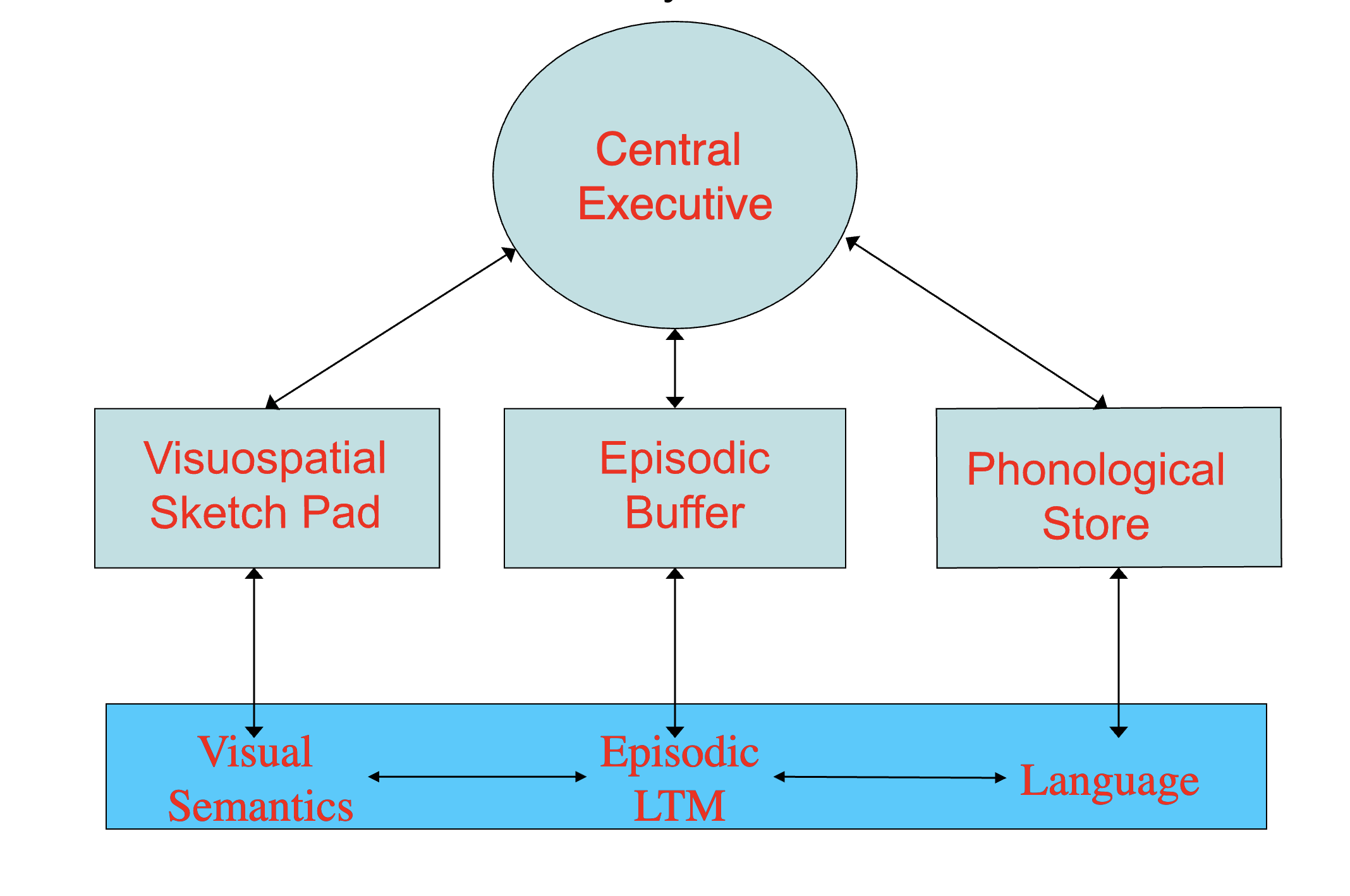
prefrontal cortex
important in maintaining task relevant information over the short term and during distractions
distraction/interference
damaged PFC can’t hold information about the end-game of a task, therefore you can’t move much information from STM → LTM
encoded interactions
attributes and features which are bound into an episode
automatic encoding
you remember things you pay attention to and automatically encode a lot of information
controlled encoding
focusing attention on a subset of information for better encoding
maintenance rehearsal
simply repeating items over again
LOP framework

doubts about depth
semantic processing isn’t always the best case (rhyming tasks) and there are more factors than encoding in play during retrieval
distinctiveness
memory is determined by how well the information specifies the event, such as color, gender, age
von restorff effect
making one item distinct by changing the color increases remembering
organization/chunking
grouping individual items into larger units based on relationships around the items
elaboration
linking information together to generate your own example
self-referent encoding
making information personally relevant, potentially the deepest level of processing
spacing effects
spacing out your learning results in better retention, distributing encoding results in better learning
testing effect
testing yourself on learned material works better than simply studying
retrieval
reconstruction/reactivation of attributes stored during encoding
transfer appropriate processing
the problem with LOP effect is it is mostly focused on encoding so 32 sentences were presented, all with one word missing, and there were two encoding and two retrieval conditions (semantic and rhyming). a match between encoding and retrieval conditions meant better memory
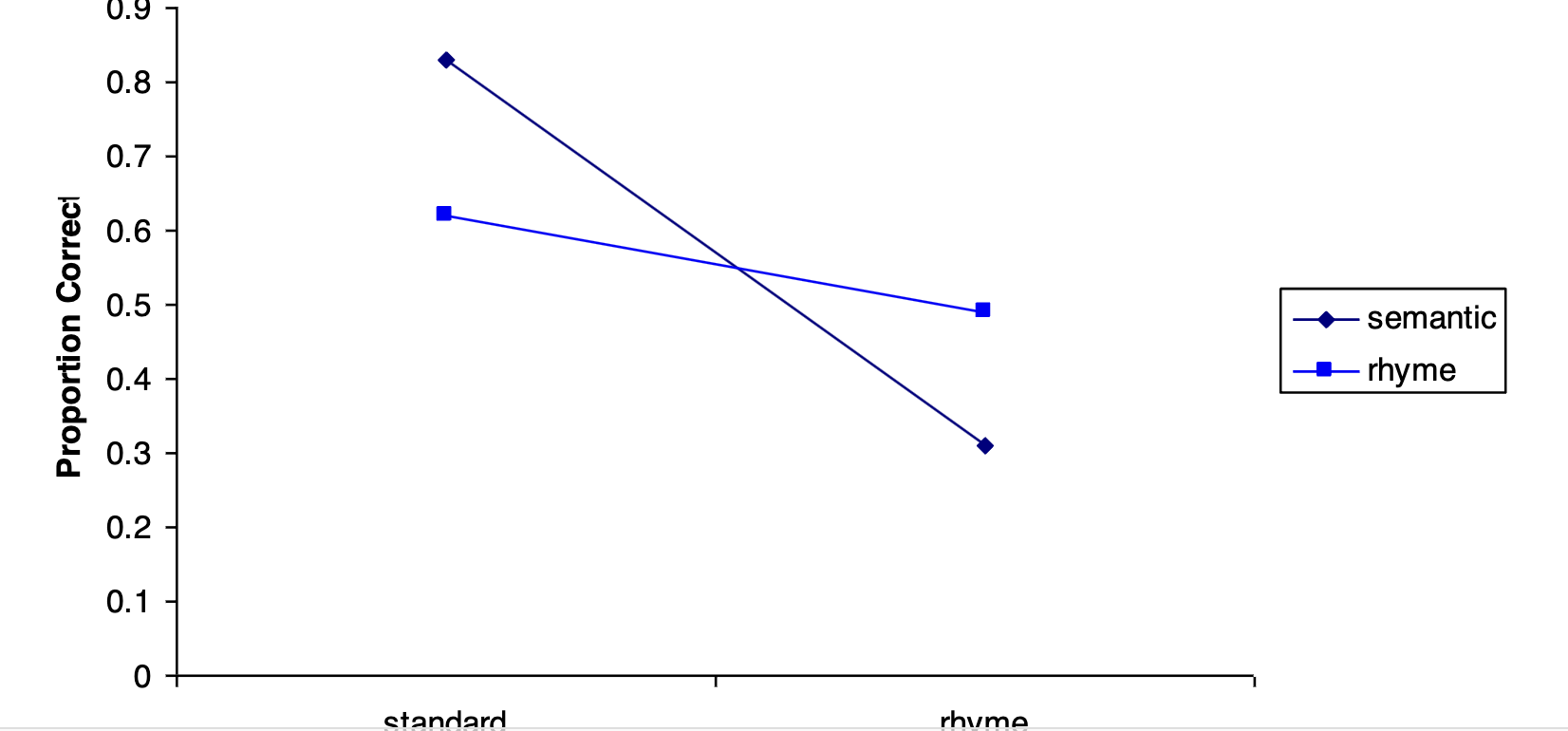
multiple memory systems
idea that there are multiple independent memory systems specialized to each solve a different problem or operation
memory taxonomy
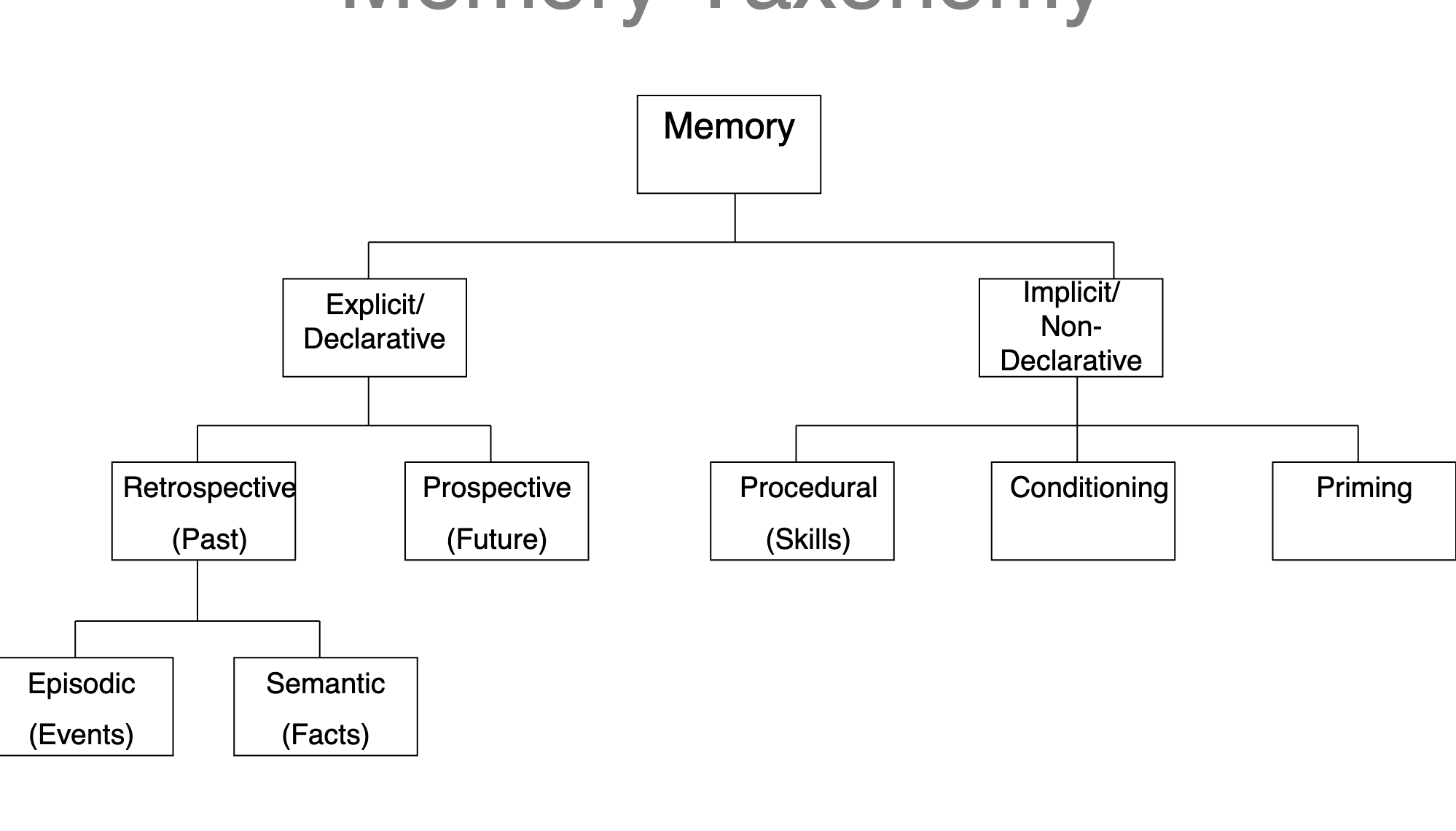
explicit memory
tests that directly require conscious memories and participants know that it is happening. retention, encoding, and retrieval impacted
implicit memory
tests that subconsciously measure retention. a “catch-all” for all of the things we learn while unaware such as mastery of driving or riding a bike. laws of memory don’t apply as much. less influenced by things like retention interval
implicit memory task
rating words and then filling in the words from a blank, you are more likely to use words from the rating words category even if they are generally infrequently used words
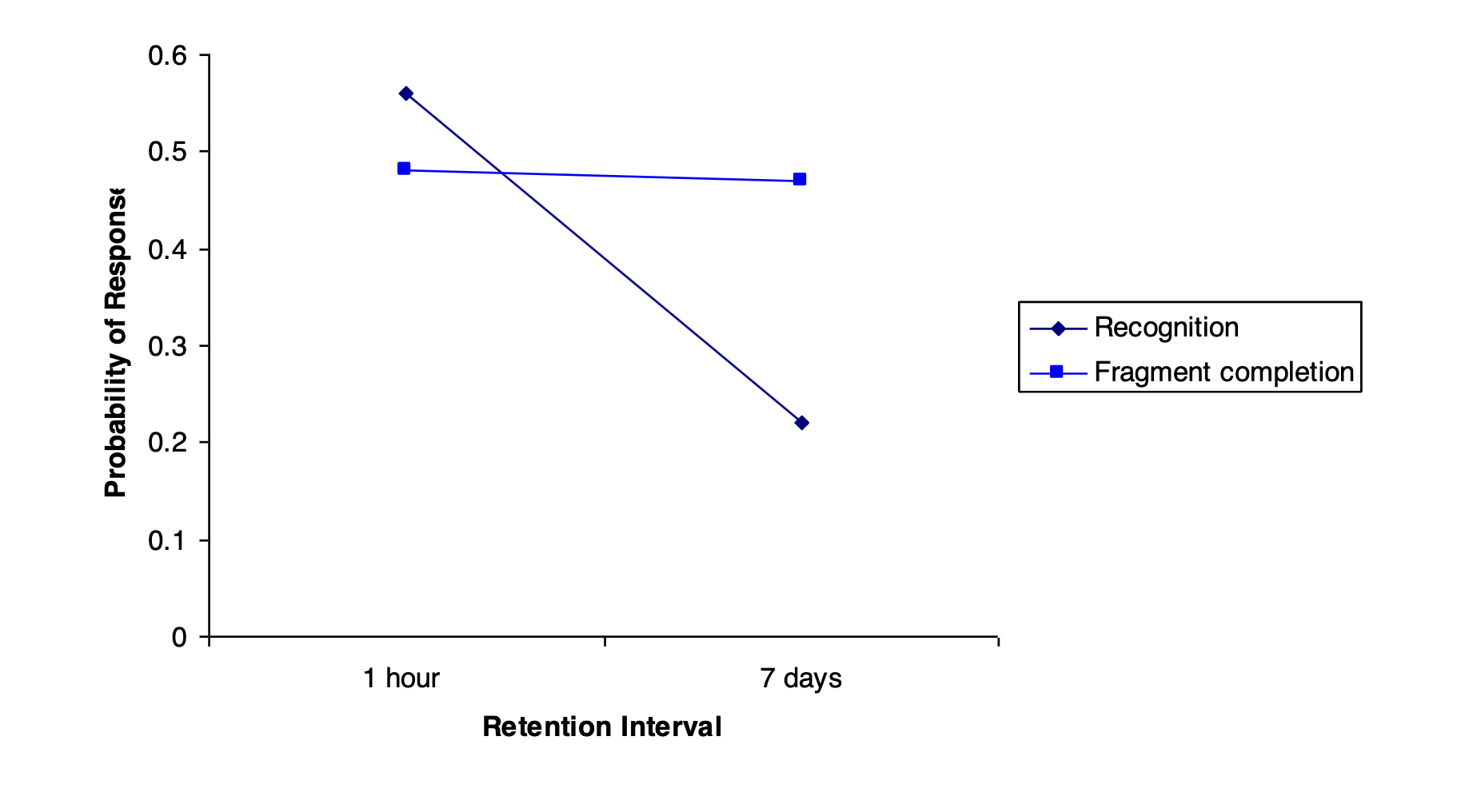
declarative memory
knowing that you know something, includes personally relevant information and facts
procedural memory
cognitive and motor skills that you cannot really verbally express how you know. characterized by gradual, incremental learning
retrospective memory
memory for the past in which we can reflect back and recollect instances
prospective memory
memory for things we remember to do in the future. pervasive in every day life (remembering to take your pills, go to work)
factors influencing success on prospective memory
habitual vs infrequent (habitual is easier), event based vs time based (event based is easier)
episodic memory
remembering information that is tied to a specific spatiotemporal context (an event) related to the hippocampus. needed for specific episodes like high school grad
semantic memory
a person’s general knowledge about the world (facts, concepts, vocabulary) semantic memory is not tied to a specific context. needed for specific facts such as the fact that graduation generally occurs in the spring
use of semantic memory in memories
fills in gaps that we forgot with general knowledge of life, potentially leading to errors and biases
constructive processes
taking information and combining it with existing knowledge
reconstructive processes
retrieval of information in combination of existing knowledge
schemas
organized clusters of knowledge about events or objects based on experience. in the study where people tried to recall a professor’s office, 30% remembered books despite no books being present because of the ____ that there are books in a professor’s office
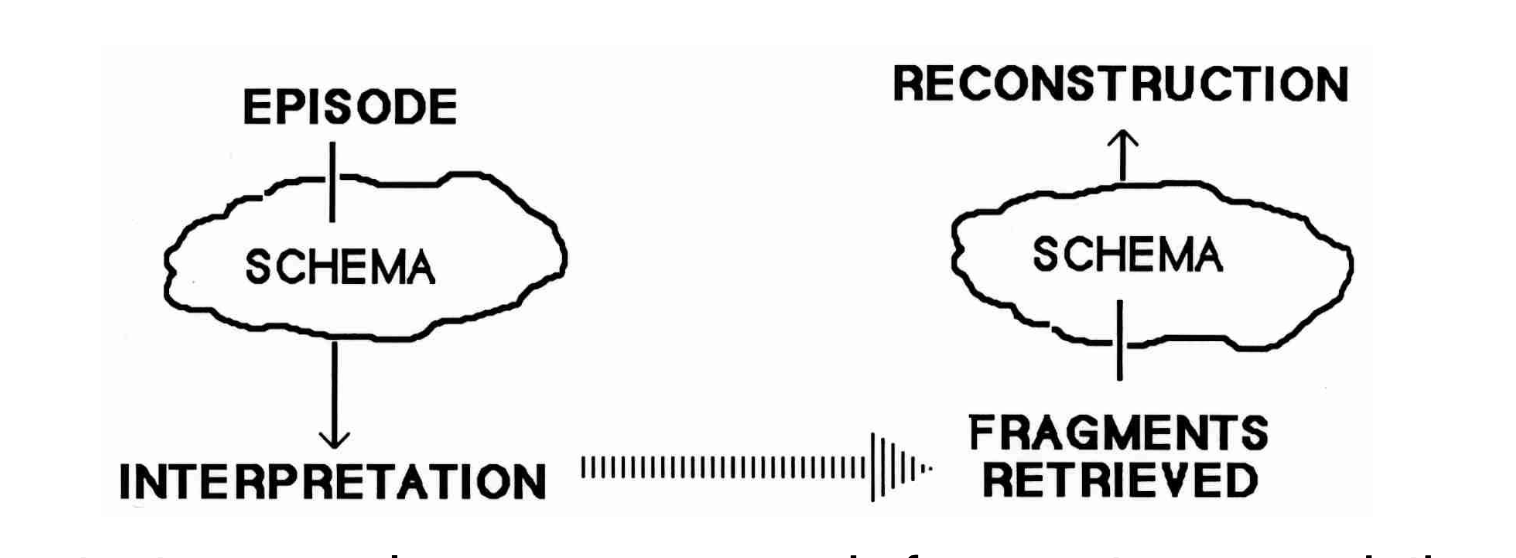
memory accuracy
memory is subject to errors and biases due to how it is degrading. memory can be primed if we are told information because we can add it to our episodes.
memory distortions
combinations of an original event, schemas, and informations after an event. implications of this: eyewitness testimonies and ID of criminals may be less accurate.
intrinsic context
features which are integral part of target stimulus
extrinsic context
other features present at time of encoding (time
place, cognitive state)
temporal context
context “cues” for which items should be recalled, items are associated with the temporal context present
lag recency effect
after recalling a given word, the next word recalled tends to come from a nearby serial position
mood congruency
mood influencing memory
state dependent memory
the state you’re in psychologically (i.e. under the influence) changing how things are. unusual cues at encoding are not present at retrieval leading to poorer performance.
forgetting
The process by which we lose information
(typically over time)
locus of forgetting
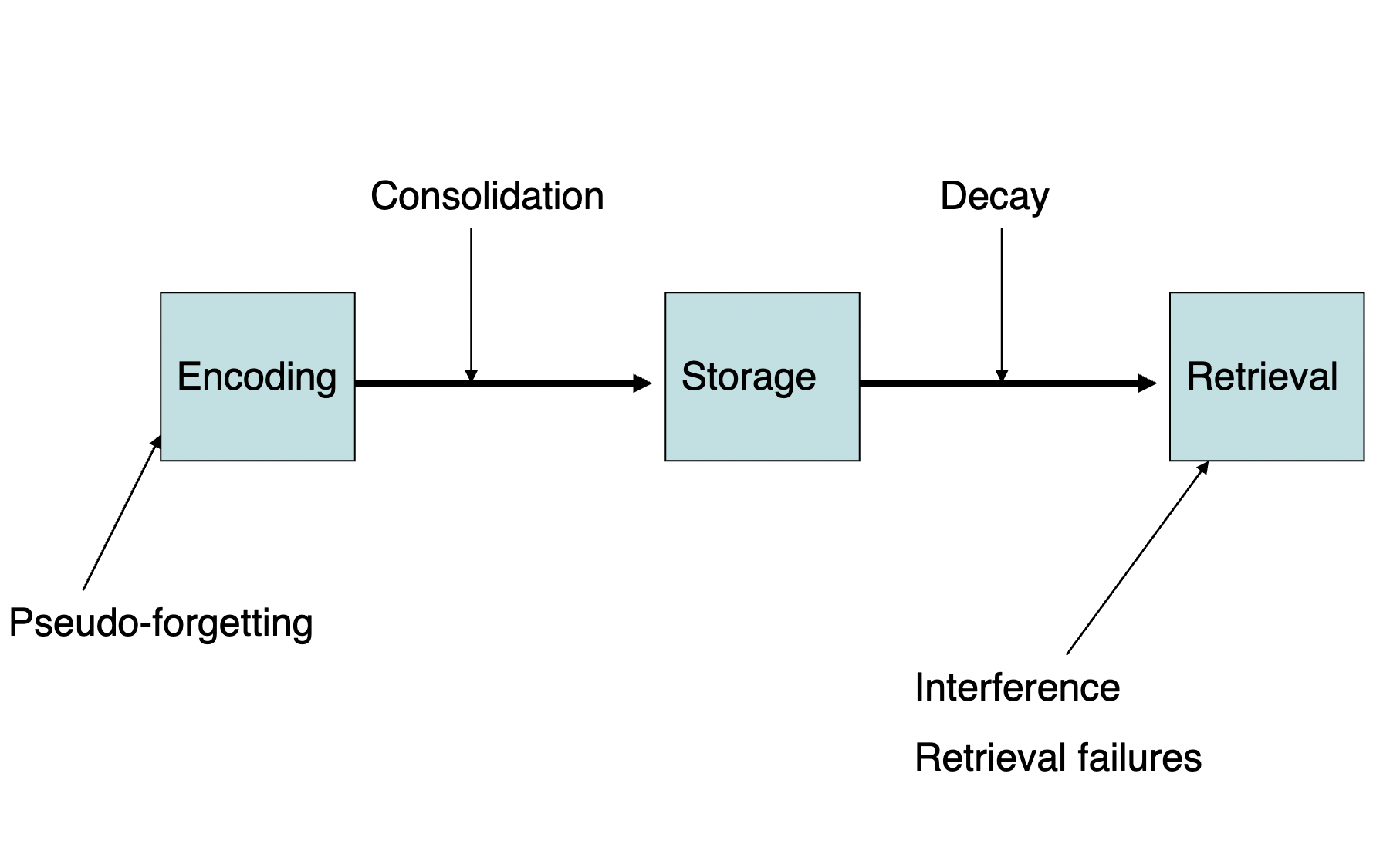
consolidation
activity that is assumed to be necessary after studying to solidify it into a relatively permanent form
ribot’s law
brain damage impairs recently formed memories to a greater extent than older memories
decay
memory traces fade spontaneously with time
problems with theory of decay
Over the course of 100 yrs in psychology little evidence has been found supporting pure decay, Baddeley & Scott (1971)
interference theory
similar items in memory can get in the way of each other and accounts for most forgetting
retroactive interference
new information interferes with ability to recall old information
proactive interference
old information interferes with ability to recall new information
retrieval failures
many “forgotten” memories can be retrieved if the appropriate context is reinstated
availability
information is adequately encoded and stored in the system
accessibility
information can be adequately retrieved from the system
search failures
inability to find what you’re looking for, directing and focusing searches
cue-overload principle
the more information that is subsumed under a given retrieval cue, the lower the probability of retrieving any given piece of information
list-length effects
as list-length increase, probability correct decreases